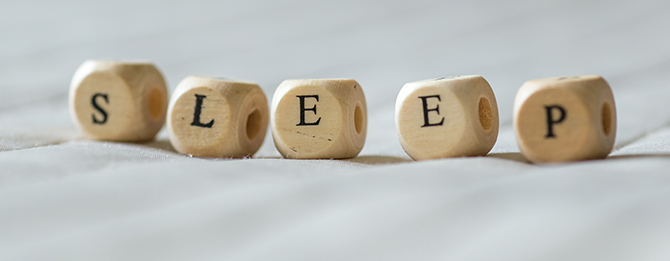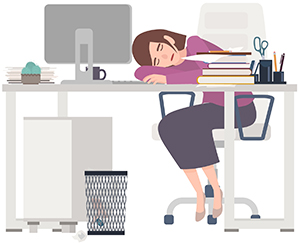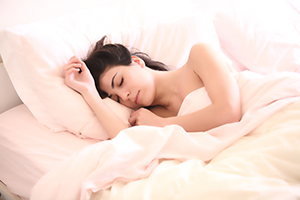SLEEP MATTERS
EFFECTIVE WAYS TO CATCH SOME Z’s

With lives multi-tasked to the umpteenth degree, many of us come up short on shut-eye. So instead, you toss and turn as you slumber, upsetting the all-important REM-rich cycles. Here are some compelling reasons why you need more shut-eye and effortless ways to catch a few winks.

YOUR WEIGHT
Those who skimp on sleep are significantly more likely to be overweight than those who consistently get seven hours of shut-eye a night. When you›re sleep-deprived, your body produces more stress hormones, such as cortisol, which slows down your metabolism and ups the production of appetite-increasing hormones, such as leptin.
YOUR HEALTH
Being tired means you›re more susceptible to everything from developing diabetes to catching colds. For example, experts indicate that after six nights of four-hour sleep, you may have an increase in higher blood sugar (an early warning sign of diabetes) and weaker immune systems than those who slept eight hours. In addition, sleeping only six hours a night increases the risk of heart disease by 18 percent
REST EASY
A quick reach for over-the-counter sleep aids may seem like an easy solution. However, drugs may cause more problems than they solve. But there are natural ways to train your body to sleep on a regular schedule without the aid of chemicals. Here are some wide-awake ways to start on a journey to quality shut-eye and sleep like a baby.
• Unplug That’s right, no screen time. Even an innocent Facebook scroll messes with sleep. Blue light from your phone disrupts your body’s production of melatonin: the hormone that regulates your sleep/wake cycle.
• Decompress Now that you›ve unplugged, why not luxuriate in the disconnect? Wind down with soothing music or take a luxurious bath. Or do as so many fellow New Yorkers and meditate.
• Read A Bestseller Swap your iPad/Kindle for an actual book. Reading anything that interests you fuels inspiration and can allow big ideas to come to you in your sleep. Plus, the actual act of reading will peacefully lull you into slumber.
• Stretch You might think that going to sleep is as easy as putting your body in bed and flipping off the lights. However, the National Sleep Foundation suggests a time for total relaxation before bedtime. A simple stretching routine will help tremendously. Deep breathing as you slowly stretch calms the brain and body. Do this before you›re ready to crawl into bed to encourage sounder slumber.
• Avoid Late-Night Eating Make it a rule to eat earlier in the evening and to avoid heavy, rich foods within two hours of bedtime. Spicy/acidic food can often cause stomach trouble and heartburn for some. Also, avoid alcoholic beverages since they will undoubtedly interfere with your sleep cycle.
• Make Some Noise Sometimes, the right solution might not be to eliminate noise—but to increase the noise. This can be done with the magic of a white noise machine, which soothes you to sleep with sound waves in a wide range of frequencies. The white noise drowns out the sounds of your external environment, masking them with a whooshing sound like the soothing sounds parents make to their newborns. Some white noise machines also come with settings called “soundscapes,” which include a variety of nature scenes like ocean waves, rainfall, and forest walks.
CATCH 40 WINKS

Of course, nothing can take the place of a good night’s sleep. But a short, 20-minute nap can help ease a bout of drowsiness. Napping can help fight off physical and emotional fatigue, improve work performance, and even fight depression. And, most certainly, it will boost your energy level to complete the remainder of your daily tasks. If you’re in an office environment, it’s undoubtedly difficult to catch some z’s at your desk. There are techniques, though, that provide similar benefits to a 20-minute snooze. Step away from your workload and relax your body and close your eyes. Then, take ten deep breaths. Doing this will help to recharge your body and renew your zest.
RESTED DEVELOPMENT
Do you wake up before your alarm goes off every morning?
A. YesB. No
Best answer: A
You’ll wake up on your own if you’re getting enough sleep, which many of us aren’t. More than 43 percent report feeling so tired it affects their day-to-day activities three days a week.
How fast do you fall asleep when you get into bed?
A. As soon as your head hits the pillow
B. Within 10 to 15 minutes
C. You toss and turn for almost an hour
Best answer: B
If you lose consciousness almost immediately after crawling under the covers, you’re sleep-deprived. But if you toss and turn, consumed by stress, you may be spending too much time in bed, which contributes to insomnia.
How much caffeine do you consume?
A. You’re useless without your morning brew and afternoon cappuccino (not to mention those two diet sodas you drink with lunch.
B. You have a cup of coffee in the morning and either a cup of coffee or a diet drink in the afternoon as a pick-me-up
C. Just one cup in the morning.
Best answer: C
The less caffeine you crave, the more rested you are. If you can get through that 3 pm slump (your body’s natural low point) without reaching for the cup of java, then you’re master of your sleep domain.
DEFINING SLEEP DISORDERS

Sleep disorders have become increasingly common, whether caused by a health problem or too much stress. About 75 percent of Americans between 20 and 59 report regular sleeping difficulties.
Most adults occasionally experience sleeping problems due to hectic schedules, unsolved problems, and other outside influences. However, when these issues occur regularly and interfere with daily life, they may indicate a sleeping disorder. Of course, not all sleep disorders are the same. Here is a definitive look at the most common.
Insomnia It refers to an inability to fall—and remain—asleep. Causes include jet leg, stress, anxiety—and even digestive problems. Insomnia can be very problematic and, unfortunately, is most prevalent among women. Insomnia is usually classified as one of three types: chronic, intermittent, and transient.
Sleep Apnea This is characterized by pauses in breathing during sleep and considered a serious condition that causes a deprivation of oxygen to the body.
Narcolepsy This condition is characterized by “sleep attacks” that occur during the day. It usually happens when you suddenly feel exhausted and fall asleep without warning.





